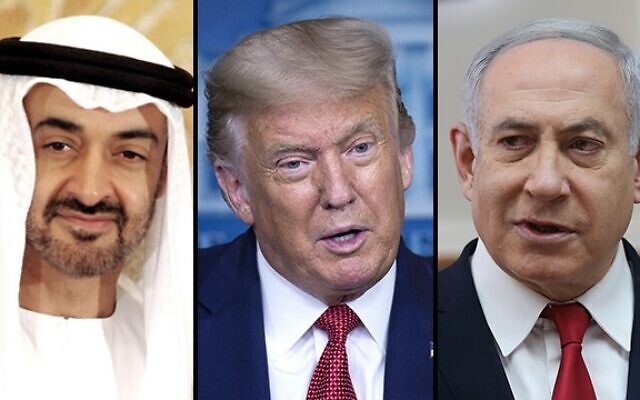What Israel-UAE Recognition Means
Palestinians express anger and dismay over another Arab state agreement with Israel.

On Aug. 13, when the United Arab Emirates agreed to pursue full normal relations with Israel without any Israeli withdrawal from lands it won in the June 1967 war, the sacred negotiating formula “Land for Peace” that had dominated Arab-Israeli talks for half a century, abruptly ended. In return for only an Israeli promise not to annex any of the land it had occupied and administered on the West Bank since June 1967, a third Arab state accepted Israeli legitimacy. Egypt, Jordan, and now the UAE have demonstrated that while each had or has residual, if not waning sympathies for the Palestinian plight, each refused to postpone advancement of their own strategic national interests. None of them proved patient enough to wait for the Palestinians to enter serious negotiations with Israel.
Initial Palestinian reaction to the UAE-Israel understanding was fierce anger and total dismay. Advocates, diplomats, organizations, and countries that seek a two-state solution to the Palestinian-Israeli conflict are keenly disappointed because the UAE has advanced Israel’s status in the region without forcing Israel to pay a price to the Palestinians. Those who advocate for the Boycott, Divestment and Sanctions (BDS) movement against Israel now contend with another Arab state that accepts Israel’s legitimacy.
The UAE follows Egypt (1979) and Jordan (1994) in recognizing Israeli statehood without obtaining a political promise, self-determination, or an independent state for the Palestinians. Israel pursued normalization of relations with the UAE because doing so was definitely in its national interest. Around its borders, Israel sees Arab states crumbling or fraying at the edges. They are all under the combined weight of onerous economic decline, pesky COVID-19 issues, massive displaced populations, and pockets of corruption in pandemic proportions.
Israel has again internalized the reality that the Palestinian political leadership is sclerotic, divided, dysfunctional, and highly autocratic. For Israel, resolving the Palestinian issue is not an existential matter.

What matters for Israel is its security relationships with Jordan and Egypt, and keeping Iranian influence to a minimum in Lebanon, Syria and among the Palestinians. Israel seeks to be proactive in supporting its Sunni Arab friends in the Gulf, important allies against both Iran and the spread of Chinese influence regionwide. A central core of Zionism remains: to be active, not passive, turn challenges into opportunities, adjust on the run, shape one’s tomorrow, and preclude nothing, except the country’s demise.
Since after the June 1967 War, under the guidance of 10 successive U.S. presidents, from Lyndon Johnson to Donald Trump, the United States became the primary steward of Arab-Israeli conflict negotiations. Each president operated with the land-for-peace formula. The concept was enshrined in UNSC [United Nations Security Council] Resolution 242 (November 1967) which spoke about the “inadmissibility of the acquisition of territory by war,” and critically, the “withdrawal of Israeli forces [from lands] occupied in the recent conflict.” Simply put, the formula is: under what circumstances and over what period of time would Israel return tangible land to an Arab party living adjacent to it, and what intangible promise, such as a treaty or agreement, would Israel receive in return?
As far as the Gaza Strip is concerned, Israel returned that to Palestinian leadership in August 2005. Israel annexed to itself a large segment of Jerusalem in June 1967. And for the Golan Heights, the United States recognized Israeli sovereignty over them (formally annexed by Israel in 1981) in March 2019.
In the UAE-Israel agreement, Israel has not promised the return of any territories, but instead promised not to annex any lands on the West Bank. This agreement does not preclude that at some future point the area of the West Bank, or a portion of it, could be become part of a Palestinian entity or eventually annexed to Israel.
[Prime Minister Benjamin] Netanyahu, with many threatened gyrations toward annexation in May to July, seems to have settled comfortably in [predecessor] Menachem Begin’s philosophical camp, at least for the time being: Do no harm, even if political supporters to your right think you have abandoned the dream of annexation. Addressing the Knesset Sept. 25, 1978, Begin said that “Israel would assert its right over sovereignty in the West Bank, Judea and the Gaza Strip against the background of counterclaims, and if no agreements are reached at the present time [with the Palestinians and Israel], then the present autonomy arrangements and Israel’s security will remain in force.”
For not annexing land – at least not yet – and in spite of his other achievements, outstanding and regretful in the over a decade he has been in office, Netanyahu has secured an esteemed place in the annals of Israeli history. He is one of the four Israeli prime ministers who personally escorted Israel statehood toward acceptance and legitimacy: David Ben-Gurion, in declaring and sustaining the state; Menachem Begin in gaining Egyptian recognition; Yitzhak Rabin, in negotiating the peace treaty with Jordan, and now Netanyahu with the UAE’s portended recognition.
There are six other interim conclusions to be considered:
1. It is evident that a military-strong Israel carries favor and weight among Middle Eastern countries, particularly at a moment when the U.S. and EU do not have strong footprints in the region. Those who advocate for a militarily strong Israel will feel gratified by the result of the UAE-Israel agreement.
2. Radical Islam as a core theological organizing platform for badgering and menacing Israel took a body blow; instead a secular Arab national view accepted the reality of Israel as a Jewish state. Other Arab states may do likewise in the near and intermediate future.
3. Unilateral actions such as annexation or building of settlements need not take place for Israel to enhance its security.
4. U.S. politicians — both Democrats and Republicans — who strongly opposed Israel’s annexation of any portion of the West Bank are saved from taking a contentious position on annexation as they enter the coming election cycle.
5. The Trump administration gleefully announced the agreement; similarly, the Biden-Harris ticket called the event a badly needed act of statesmanship. Both major parties continuously endorse Israel as a highly valued strategic partner in a perennially volatile neighborhood. Concern that Israeli policies would be a partisan “wedge” issue in the 2020 elections are greatly diminished.
6. While Washington took the public credit for this agreement, it unfolded because decades of private talks transpired between UAE and Israel officials.
Kenneth Stein is a professor at Emory University, director of the Emory Institute for the Study of Modern Israel and founding president of the Center for Israel Education.





comments